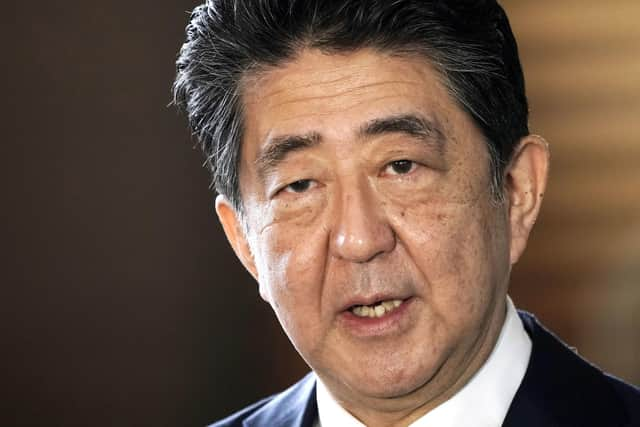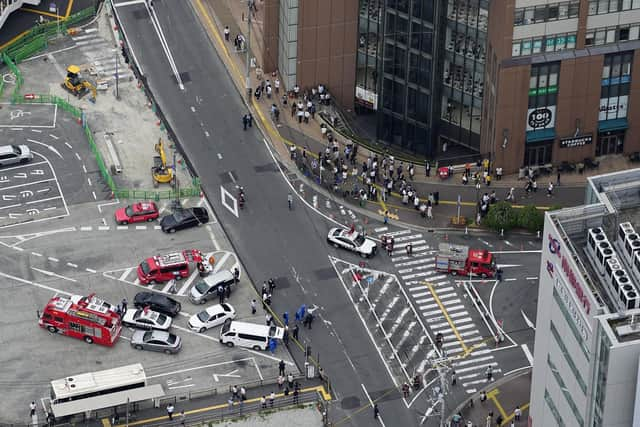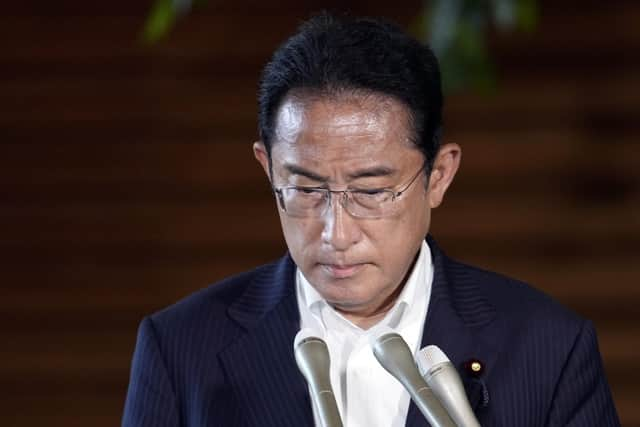Shinzo Abe shot: Former Japan Prime Minister dies after shooting during campaign speech
and live on Freeview channel 276
The former prime minister was shot while giving an election campaign speech in Nara, western Japan, on Friday.
Mr Abe was shot from behind minutes after he started his speech in Nara in western Japan, and a man was arrested near the scene.
Advertisement
Hide AdAdvertisement
Hide AdThe 67-year-old former leader was pronounced dead after being airlifted to hospital.


Local fire service official Makoto Morimoto said the 67-year-old Mr Abe was not breathing and his heart had stopped while being airlifted to hospital.
Mr Abe was Japan’s longest-serving leader before stepping down for health reasons in 2020.
Police arrested the suspected gunman at the scene of the attack, which shocked people in a country known as one of the world’s safest.
Advertisement
Hide AdAdvertisement
Hide AdPrime Minister Fumio Kishida, who belongs to the same political party as Mr Abe, returned to Tokyo from a campaign trip after the shooting and called the attack “dastardly and barbaric”, and said that it was “absolutely unforgivable” that the crime had taken place during the election campaign – the foundation of democracy.


Police arrested a male suspect at the scene of the shooting in Nara.
The public broadcaster NHK aired footage showing Mr Abe collapsed on the street, with several security guards running toward him. He was bleeding and holding his chest.
A moment later, security guards leap on top of a man in a grey shirt who lies face down on the pavement.


Advertisement
Hide AdAdvertisement
Hide AdA double-barrelled device that appears to be a handmade gun is seen on the ground.
Nara prefectural police confirmed the arrest of Tetsuya Yamagami, 41, on suspicion of attempted murder.
She tweeted: “Devastated to hear about the attack on former Prime Minister Abe. We stand with our Japanese friends at this difficult time.
“Our thoughts and prayers are with his family and friends.”
Labour leader Sir Keir Starmer said it was a “truly dark day”, after the shooting of former Japanese prime minister Shinzo Abe.
Advertisement
Hide AdAdvertisement
Hide AdThe popular former leader is still influential in the governing Liberal Democratic Party and heads its largest faction, Seiwakai.
Elections for Japan’s upper house, the less powerful chamber of its parliament, will take place on Sunday.
“I use the harshest words to condemn (the act),” Mr Kishida said as he struggled to control his emotions.
He said the government planned to review the security situation, but added that Mr Abe had the highest protection.
Advertisement
Hide AdAdvertisement
Hide AdNara, once the capital of Japan, is just to the east of Osaka on the country’s main Honshu island.
Mr Abe stepped down in 2020 because he said a chronic health problem has resurfaced. He has had ulcerative colitis since he was a teenager and said the condition could be controlled with treatment.
His ultra-nationalism had riled the Koreas and China, and his push to normalise Japan’s defence posture had angered many Japanese people.
Mr Abe failed to achieve formally rewriting the US-drafted pacifist constitution because of public support.
Advertisement
Hide AdAdvertisement
Hide AdLoyalists said his legacy was a stronger US-Japan relationship that was meant to bolster Japan’s defence capability.
But Mr Abe made enemies by forcing his defence goals and other contentious issues through parliament, despite strong public opposition.
His political rhetoric often focused on making Japan a “normal” and “beautiful” nation with a stronger military and bigger role in international affairs.
Many foreign officials expressed shock over the shooting.
Prime Minister Boris Johnson said the killing of former Japanese prime minister Shinzo Abe was “incredibly sad”, adding: “His global leadership through unchartered times will be remembered by many.”
Advertisement
Hide AdAdvertisement
Hide AdLabour leader Sir Keir Starmer said it was a “truly dark day”, after the shooting, while Foreign Secretary Liz Truss said that she was “devastated” at the news.
Chancellor Nadhim Zahawi said the killing of former Japanese prime minister Shinzo Abe is “heartbreaking”.
He tweeted: “Today’s news from Japan is heartbreaking. We enter politics to serve and to try and make the world a better place. Shinzo Abe has lost his life in pursuit of that noble aim. May he rest in eternal peace.”
In response to a question, Chinese Foreign Ministry spokesman Zhao Lijian said China was “following the development of the situation”.
Advertisement
Hide AdAdvertisement
Hide Ad“Our thoughts, our prayers are with him, with his family, with the people of Japan,” US secretary of state Antony Blinken said while attending a meeting of 20 foreign ministers in Bali, Indonesia.
Mr Abe said he was proud of working while leader for a stronger Japan-US security alliance and shepherding the first visit by a serving US president to the atomic-bombed city of Hiroshima.
He also helped Tokyo gain the right to host the 2020 Olympics by pledging that a disaster at the Fukushima nuclear plant was “under control” when it was not.
Mr Abe became Japan’s youngest prime minister in 2006, at age 52, but his overly nationalistic first stint abruptly ended a year later, also because of his health.
Advertisement
Hide AdAdvertisement
Hide AdThe end of Mr Abe’s scandal-laden first stint as prime minister was the beginning of six years of annual leadership change, remembered as an era of “revolving door” politics that lacked stability and long-term policies.
When he returned to office in 2012, Mr Abe vowed to revitalise the nation and get its economy out of its deflationary doldrums with his “Abenomics” formula, which combined fiscal stimulus, monetary easing and structural reforms.
He won six national elections and built a rock-solid grip on power, bolstering Japan’s defence role and capability and its security alliance with the US.
He also stepped up patriotic education at schools and raised Japan’s international profile.
